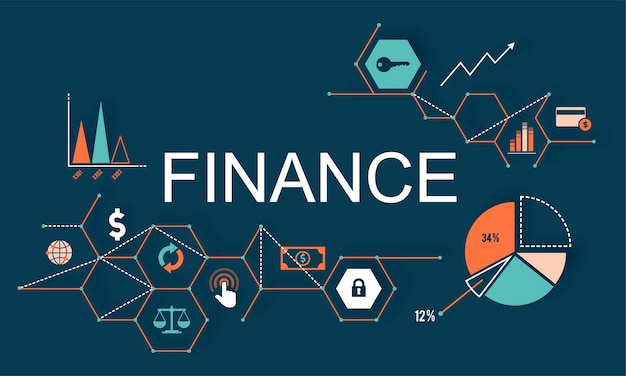
Personal finance is a fundamental aspect of adult life, yet many people struggle to navigate its complexities effectively. From budgeting and managing debt to building a financial plan for the future, developing sound financial habits is essential for achieving financial stability and long-term prosperity. In this article, we will explore the principles of personal finance and provide practical examples of financial education, including budgeting techniques, debt management strategies, and the importance of creating a comprehensive financial plan.
Understanding Personal Finance
Personal finance encompasses the management of an individual’s financial resources, including income, expenses, savings, investments, and debt. It involves making informed decisions about spending, saving, and investing to achieve financial goals such as homeownership, retirement, education, and wealth accumulation. Effective personal finance requires a combination of knowledge, discipline, and planning to maximize financial resources and minimize financial stress.
Budgeting
Budgeting is the foundation of personal finance, providing a roadmap for managing income and expenses effectively. A budget is a financial plan that outlines anticipated income sources and allocates funds to various categories of spending, such as housing, transportation, groceries, utilities, entertainment, and savings. By creating and adhering to a budget, individuals can track their spending, identify areas for potential savings, and prioritize financial goals.
Example of Budgeting
Let’s consider an example of budgeting for a young professional named Sarah. Sarah earns a monthly salary of $3,500 after taxes and deductions. After reviewing her expenses and financial goals, Sarah creates the following budget:
– Housing: $1,000 (30% of income).
– Transportation: $300.
– Groceries: $300.
– Utilities: $150.
– Entertainment: $200.
– Savings: $500.
– Debt Repayment: $300.
– Miscellaneous Expenses: $250.
– Total Expenses: $3,000.
– Remaining Income: $500.
By allocating her income to specific categories and setting aside funds for savings and debt repayment, Sarah can ensure that her financial needs are met while working towards her long-term goals.
Managing Debt
Debt management is another crucial aspect of personal finance, as excessive debt can hinder financial progress and lead to financial hardship. Managing debt involves understanding the types of debt, prioritizing repayment, and adopting strategies to reduce debt balances efficiently. Common types of debt include credit card debt, student loans, mortgages, auto loans, and personal loans.
Example of Debt Management

Consider an individual named Alex who has accumulated $20,000 in credit card debt with an average interest rate of 18%. Alex decides to tackle his debt by implementing a debt repayment strategy known as the debt avalanche method. Under this approach, Alex prioritizes paying off debts with the highest interest rates first while making minimum payments on other debts.
Alex allocates $1,000 per month towards debt repayment and focuses on paying off his credit card debt aggressively. By allocating additional funds towards the credit card with the highest interest rate while maintaining minimum payments on other debts, Alex accelerates his debt payoff timeline and saves money on interest charges in the long run.
Building a Financial Plan
A financial plan is a comprehensive roadmap that outlines an individual’s financial goals, strategies, and action steps for achieving financial success. A well-designed financial plan takes into account factors such as income, expenses, savings, investments, retirement planning, insurance needs, estate planning, and risk management. It serves as a guiding framework for making informed financial decisions and adapting to changing circumstances over time.
Example of Financial Planning
Let’s return to Sarah, the young professional, who wants to create a financial plan for her future. After assessing her current financial situation and defining her goals, Sarah develops a financial plan that includes the following components:
– Emergency Fund: Sarah aims to build an emergency fund equal to six months’ worth of living expenses to cover unexpected financial setbacks such as job loss, medical expenses, or car repairs.
– Retirement Savings: Sarah plans to contribute a portion of her income to a retirement savings account such as a 401(k) or individual retirement account (IRA) to secure her financial future in retirement.
Investment Portfolio: Sarah intends to diversify her investment portfolio by allocating funds to a mix of stocks, bonds, mutual funds, and other investment vehicles to achieve long-term growth and wealth accumulation.
– Insurance Coverage: Sarah considers her insurance needs, including health insurance, life insurance, disability insurance, and property insurance, to protect herself and her assets against unforeseen risks.
– Estate Planning: Sarah consults with an estate planning attorney to create essential legal documents such as a will, trust, and power of attorney to ensure her wishes are carried out and her loved ones are provided for in the event of her incapacity or death.
By developing a comprehensive financial plan tailored to her specific needs and goals, Sarah can proactively manage her finances, build wealth over time, and achieve financial security and peace of mind.
Conclusion:
In conclusion, mastering personal finance requires a combination of budgeting, debt management, and financial planning skills. By creating and adhering to a budget, individuals can track their spending, prioritize financial goals, and make informed decisions about their money. Effective debt management involves understanding the types of debt, prioritizing repayment, and adopting strategies to reduce debt balances efficiently. Lastly, building a comprehensive financial plan enables individuals to define their financial goals, develop strategies for achieving them, and secure their financial future. With a solid foundation in personal finance and ongoing education, individuals can take control of their finances, achieve their financial goals, and thrive in today’s ever-changing economic landscape.


